Lucy Wheeler heard about Skelton Grange through an advertisement sent in the mail. She had moved to Leeds in 1990 and had been involved in a project run by John Preston at TCV Hollybush. When she first saw the site which was primarily mown scrubland, she was impressed by its natural beauty and potential, if perhaps a little daunted by the task ahead. Nevertheless, she was keen to do something positive for the local community as well as the wildlife.
TCV Skelton Grange Environment Centre was subsequently born in 1992 as Lucy took up the role of Lower Aire Valley Project Officer. The role initially involved looking at access to the countryside and rights of way within the area but the role, as well as the community hub, grew to something much more outstanding, creating something wonderful for people and biodiversity.
Here, Lucy picks up the story in an interview to celebrate 30 years of connecting people and green spaces:
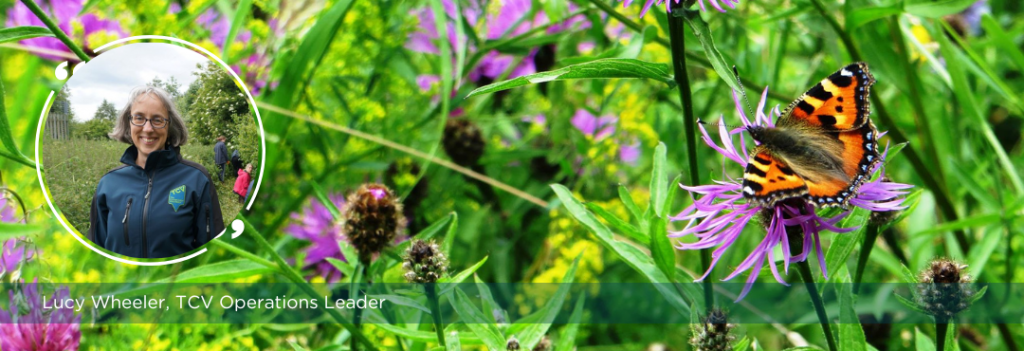
Skelton was originally a partnership between (B)TCV, the Countryside Commission and National Power. After completing a temporary contract with the Ranger Service, I moved to a job in Salford because there were no other jobs in Leeds at the time. When I saw the advertisement for the Skelton Grange position, I applied and was offered the job. I was so excited to have the opportunity to work at Skelton Grange and to develop a team there.
I always wanted to do environmental education. That was my big thing. When I first saw the site, I can remember walking up the road from the bus stop, and I did think I was in the wrong place. I thought that maybe something bad was going to happen ’cause it feels quite isolated and the first time you walk it, it feels really long.
It’s not actually long when you know where you’re going, but it felt like I was going the wrong way and then I came over the bridge and there was this dumpy little grey portacabin with absolutely nothing to recommend it. I did have a small quail, but they did a group interview thing, so all the candidates were there for the morning, and they showed us around together and there was that whole strange dynamic of everyone wondering how much to try and shove themselves forward. So, it was a weird situation!
But I could see the potential. I was trained as a teacher and had always wanted to set up an environmental education centre and make a place where children could be inspired and able to go out and really interact with nature. Like I’d been inspired by the Natural History Museum and by that kind of exposure to the natural world. I wanted to do that. I saw that Skelton had the potential to be that if I could just do some work to stop it from looking less like a dentist waiting room and make it look more appealing.
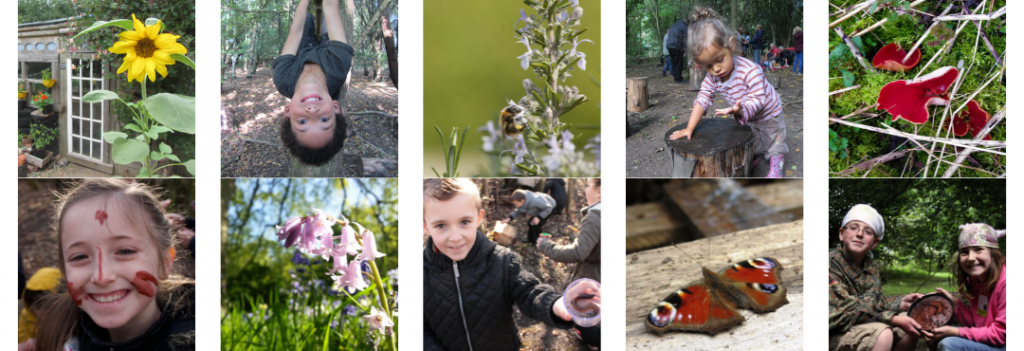
What were the early days like?
The early days were unlike any work I had done before because I was completely by myself. My manager greeted me on the first morning, gave me a pile of ring binders, and then left because he had someone starting in Hebden Bridge later that morning.
I was left alone in the building, which used to be a fisheries lab in North Wales and was full of old and rusty salinity monitoring equipment. When I opened the desk, I found a list of my predecessor’s reasons for resigning in the drawer. It was a slightly bleak start, and when I went to visit other key partners for the project, they were not very receptive because there had been previous failed attempts at the project. I felt like I was starting from a less-than-zero position in terms of credibility.
It was strange working completely by yourself, and I was very careful about timekeeping to make sure I was doing my job. I realized that I couldn’t have volunteers until I had a plan, because they need something rewarding to do. So, for six months, I was mostly alone.
Caroline Crossley was then the first proper volunteer we had, starting in late October 1992.
Caroline subsequently became the first other paid member of staff at Skelton and it was great to have her on board. At the time I was doing everything from strimming the site, to running environmental education sessions and doing all the administrative work, so to have more staff members to create a team was great. We divided the different areas of management between us based on our strengths. We each did the parts that came most naturally to us.
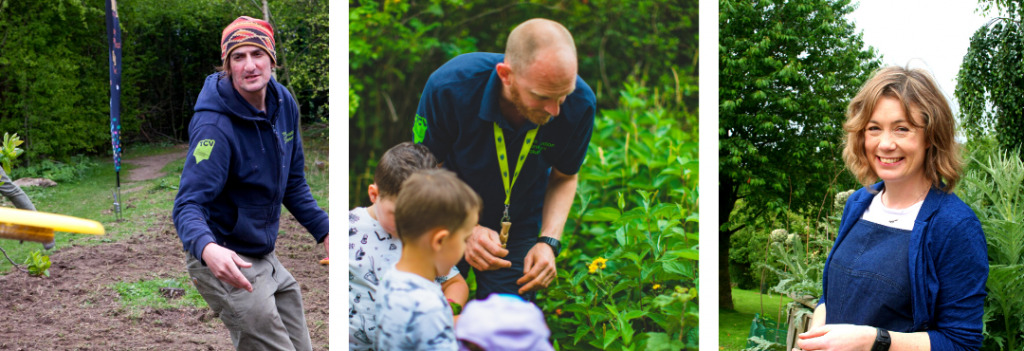
How has the site developed over time?
The site has more tree cover and hedges now. There are meadows. When I started, most of it was just pointless grass that was cut as part of a contract in that bit of South Leeds.
The site feels bigger now because you can’t see it all at once. Initially, we were allowed to use both sides of the road, but we only developed the side where the old centre was because there was only me at the beginning, and I couldn’t even think about keeping paths open on both sides. I had to mow everything if it needed it, so I drastically reduced the amount of mowed grass because I didn’t have time to cut it all.
We planted lots of trees but didn’t have much money. We got a grant to plant some hedges in the first winter, which are now boundary hedges. We planted lots of boundary hedges in the second and third winters. For the 100th anniversary of the Women’s Institute in Yorkshire, they called us and asked us to plant 100 trees, which is why we have an odd species mix in the woodland at Skelton. We had to raise any money we wanted for site development because we had no budget.
We tried to design the site so that for children, it feels even bigger than it is because we’ve now made entrances, exits, different paths, tunnels, different ways to places. If you’re canny as a leader with a group of children, you don’t take them the same way twice and they have this sensation of enormity about the site! It’s already the wildest place lots of them have ever been.
When you’re walking into the woods in summer, you’ll get little hands appearing in yours because they’ve never been under a closed tree canopy and the dark in the woods weirds them out. And when you feel it get cool when you walk into the woods, for children who aren’t familiar with that, they always get a little bit scared. Because in every children’s story ever, if it suddenly gets cool, then something bad is going to happen, there’ll be a ghost or there’ll be something spooky.
We realised that some children wouldn’t step into the long grass because they had never experienced grass that wasn’t cut before. So, we started growing meadows and cutting paths through them to give children confidence in the environment.
Once, right back in the day, we did get some children who’d never even played on grass before. Who stood there going, “Wow, it’s really bouncy!” Because they went to school in a primary school in Armley that just had a tarmac schoolyard and they lived in little back-to-back streets also with tarmac. We hope that every child in Leeds has the chance to experience grass before they turn five now.
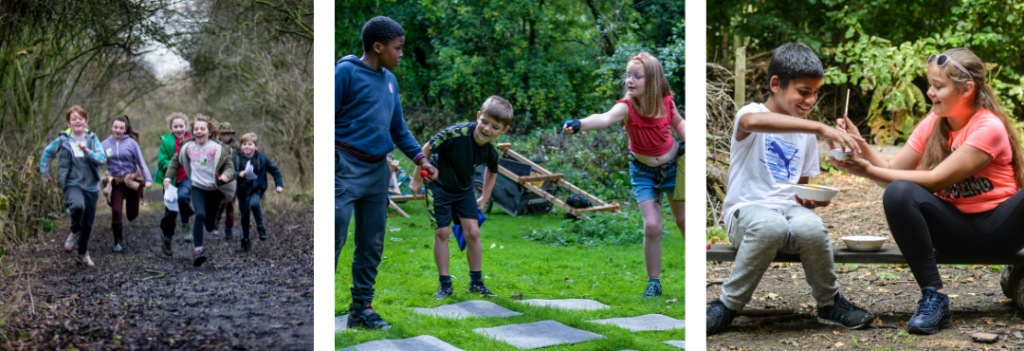
How has the centre impacted the local community?
The community in a Skelton context is people who live locally, but even more so, children who go to school in Leeds and get to visit the centre and children who come with their playschemes. And it has had an enormous impact on hundreds of thousands of children over the years.
As I’ve said, many children in Leeds have very little exposure to nature in their lives. They’re a generation of children born to a generation of parents who didn’t play outside when they were younger, who don’t really know how to play outside, who’ve lost the knowledge that it’s even a thing. Many people in my generation and my parents’ generation played behind garages or in fields, but these opportunities are not available to many children now. Coming to a natural space that feels wild and has a high level of biodiversity and wildlife can be really mind-broadening.
A lot of children today are very experience-poor because if their families don’t have money and don’t have access to a car with the best will in the world for their parents, it’s hard to take them out to see things.
We know it’s had a really big impact. We’ve had one of my members of staff who came to Skelton as a child and when he came out of university had no idea what to do with his life. He was at a bit of an uncertain ebb in his life and thought, “where have I been happy?” And he thought “Skelton” and he turned up and asked if he could he volunteer. And he’s gone from strength to strength.
We also have people who came to visit us as children who’ve qualified as teachers, bringing their own classes back because they remember the impact Skelton Grange had on them. We’ve actually spoken to lots of people about the impact. That it had on them many, many years ago in their lives and they still remember so much!
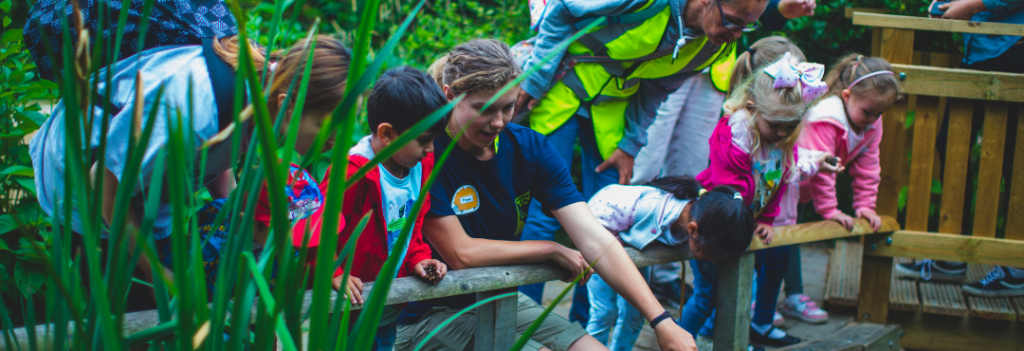
Tell us about activities for children and families at Skelton Grange
So, people tend to think of Skelton as running activities for children, but we also run lots of activities for adults (see below). In the day, in the week, in term time we run whole day sessions for school classes and the demand for those has been its highest ever since COVID. It’s been extraordinary. They’re run entirely outside, except for access to the toilets and one of our most popular topics now is The Stone Age, because we give people actual examples of what it would be like to try and live then. Making fire. Trying to make shelter, trying to cook, trying to gather food.
We run early literacy activities based in nature. We run activities based around the wildlife and habitats that we have, all to fit in with the primary curriculum at different ages.
We also run strength-building activities that we call Wild in The Woods, which are around children developing confidence and leadership skills and those more nurture-type sessions.
In the holidays we run a lot of play activity. We have been running activities through Healthy Holidays, which provide hot meals, breakfast, and food for when children go home. These activities ensure access to food for children who receive free school meals during term-time. In addition to these sessions, we run sessions for children that local schools identify would benefit from being part of it, including when the children are transitioning from primary to secondary school. We run activities for different Family Centres and organisations such as the Fostering Service and Young Carers projects too.
We also run some play activities that can function as childcare for people who are in work. Children can be booked into these sessions for the day while their parents are at work, and we will do activities such as Wild Play or Bushcraft with them.
We also run annual public events like A Winter’s Trail, our Open Day in summer and the Easter Egg Hunt!
Tell us about activities and events for adults at Skelton Grange
For adults, we run a weekly Green Gym session, which helps people get active, connect with nature, and improve their health and well-being through outdoor activities and practical conservation. We also have a Green Team session every Friday from 10 AM to 3 PM, which is a more heavy-duty practical conservation session that is our main mechanism for managing the site. Activities may include work with ponds, trees, hedge laying, and meadow management.
We also host conferences, training courses, and Employee Action Days for companies. These events offer a mixture of meeting space, well-being sessions, practical conservation sessions, and team-building activities that can be tailored to the needs of the company.
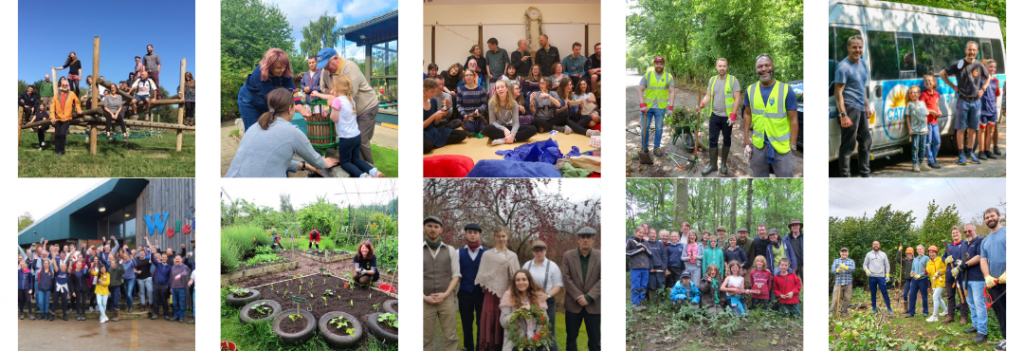
- Each year Skelton Grange sees 7000 visitors to the centre.
- The project has worked with over 100,000 young people in Leeds.
- Whilst supporting 100s of Volunteer Officers into employment or further training.
- Skelton Grange is a 4-hectare area of land that has transformed from an area of mown grass in the middle of an industrial estate to a rich and variable habitat, including woodlands, ponds and meadows.
Tell us a little bit about the neighbourhood
When we first started Skelton, our neighbours were mostly very loud and smelly. This was because we were near the Leeds wastewater treatment and sewage works. In the early days, this meant that we were periodically infested with sewage flies. Thankfully, treatment has improved since then and they are no longer an issue. However, we are still next to a wastewater treatment works and a clinical waste incinerator. At the beginning, we were also next to a power station, but it was decommissioned, and the site was empty for a while. Now, a new energy from waste facility is being built there, along with a National Grid substation. National Grid has been a valuable partner of the project since 1995 and has consistently supported us. On the other side of the road, there used to be a copperworks that would randomly blast test their copper pipes, causing explosions. They are no longer there. We are also near the Trans Pennine Trail spur that leads into Leeds, so we get many cyclists passing by.
Across the river from us is Thwaite Mills, which is an old putty mill managed by Leeds City Council. This is valuable for nature and wildlife because it makes the continuous land managed for biodiversity bigger than if it was just us. There are also residential houseboat moorings at Thwaite Mills where some of our staff live.
The area is a bit industrial, but it’s the only place in Leeds where we would be allowed to run an environmental education centre on this much land. It’s also a good place to discuss environmental topics because you can sense the impact of solid waste disposal and wastewater, as well as the generation and transportation of power. This is what we need to grapple with in environmental conversations!
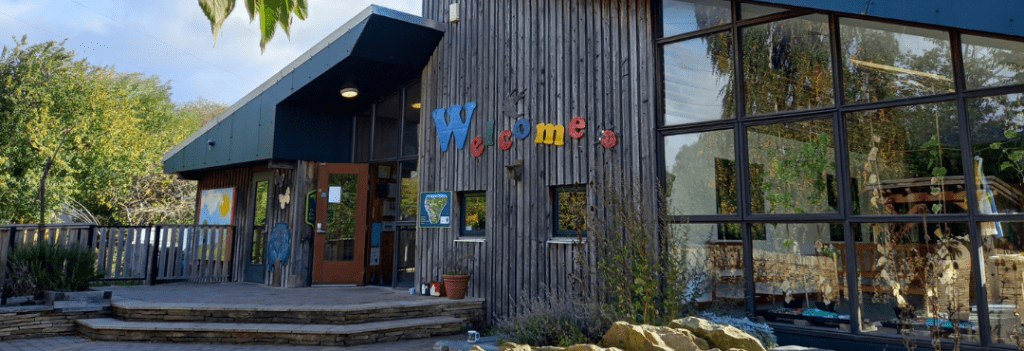
How have you all celebrated Skelton’s 30th Birthday?
To celebrate our 30th birthday we had a stakeholder event for partner organizations and project supporters, past and present, in September. We invited people back and did tours around the site, telling stories about what had changed over the 30 years. We also developed a list of 30 things we’ve learned in 30 years and displayed it at the centre.
We also did a comparison of changes over the 30 years, showing what has become more abundant, successful, or present and what has declined. We also did many before and after photographs.
Finally, we had a big party for our volunteers, inviting as many of them as we could from over the years. We think about 120 people came and had a great time at the Skelton Birthday Party!

Any plans for the future?
We always have plans for the future! We are currently focusing on developing a new area of the site. We have recently assembled a new staff team and are adjusting to a new organizational structure. In the future, we plan to do more outreach and continue to develop the site for both biodiversity and education. Our goal is to ensure that the site remains resilient as we have such high visitor numbers and has a depth of content that keeps visitors coming back. We are also focusing on developing our visitor centre and the spaces within it, and plan to offer more traineeships in the future.
How does TCV at Skelton Grange fit into the wider picture?
I think one of the big themes that runs through everything that we do as TCV is that we connect people, places and nature. And we do that through doing activities that create benefits for all of those things, for the nature, the places and the people. I think Skelton just fits completely into that.
I think that connection with nature from the earliest stages in people’s lives is completely fundamental to help us as a society try to overcome the fallacy that we are one thing and nature is another, and that we’re not actually made up of the same atoms as a swan feather and a toadstool and a piece of grass and whatever. Because, until we get over that, there will be flaws in how we as a society think about our relationship with the natural world, how we treat it, how we live in it.
That’s something TCV is very aware of and that’s something that’s sort of the essence and the core of what we do at Skelton. Nature isn’t a thing that’s out there. We’re part of it and we’re helping people rediscover that connection with it.
There’s the health and well-being benefits from spending time in nature, but there’s an even deeper connection of just remembering that you’re actually an integral part of it. It isn’t a thing like mediaeval tapestry that you’ve decided to connect to as a hobby, it’s something that you are viscerally part of. You have ecosystems living within you. You have ecosystems living on your eyeball. But we forget that and we can’t really make the right decisions for how we go forward as a species or a society until we remember that, and I think it’s critical.
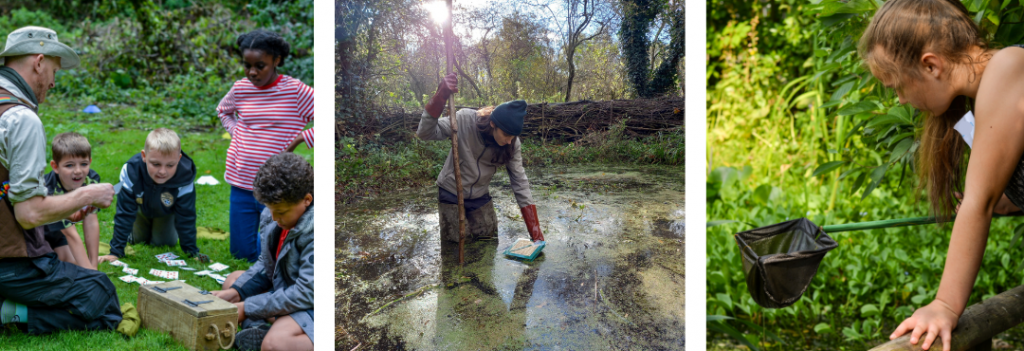
Have there been any emotional moments over the years?
Yes, many times, it has been a rollercoaster. Managing to keep a voluntary sector, charitable project like ours funded over 30 years has been an extraordinary miracle and something that we often thought wouldn’t happen. The way TCV is structured, all of the projects have to raise all of their own funding. We’re not like one of those large organizations with legacies and central funding. So, we have always had to raise what we need to deliver, and there have been many years where we thought we wouldn’t be able to do that. There have been years where we didn’t raise enough money to keep all of the staff and projects running, and we’ve had to make people redundant and stop doing things we would have liked to do. But we found different sources of funding and started again, and we’ve learned that this is part of it, it will always be part of it.
There have been emotional moments, both joyous and difficult. Watching the change we’ve made in people’s lives, the excitement and confidence in people grow, and the volunteer officer program we’ve run over the years has been astonishing. We now have people who grew into themselves through that program working across a range of organizations in the environmental, third sector, public sector, and private sector. At our 30th anniversary, many of them returned to thank us for the supportive environment we provided that set them on their career path. As a way of thanking them for their contribution, we have a wall with handprints from everyone who has helped us run the project, and photos of all the people who have ever volunteered with us. We also have a Beanstalk display showing where previous volunteer officers have gone on to work, to give current trainees and volunteer officers hope that if they stick with it, they will get a job. The Beanstalk display has now become a testament to the change we have been able to make in the world by supporting people to grow and develop.
What changes to people occur as they progress through the Skelton experience?
People change in different ways at Skelton. Some grow in confidence, while others realise entirely different areas of work that they love. One person who was a Volunteer Officer with us 30 years ago reflected that Skelton taught them it was okay to be themselves in the world, which has subsequently enabled them to support hundreds of others down the line. At Skelton, people have gained confidence by being themselves and learning that they can do things their own way and that they don’t have to become someone else’s vision of a successful person.
People have also realised that they are passionate about different areas of work, like practical conservation or working with children. Work experience opportunities have become scarce, so Skelton has provided a valuable experience for people to try different things and see what they excel at and bring them joy.
If you could describe Skelton in just 4 words, which would you choose?
Welcoming, friendly, supportive.
I don’t know what the last the last one needs to be. It’s about trying to do the right thing. Trying to make things better. In a world that at times seems literally mad.
If Skelton was a person, what qualities would they have?
If Skelton was a person they would be relaxed and natural and friendly and very at one with nature and a bit woofly around the edges, but very supportive and encompassing and understanding and they would be quietly passionate about what they do.
They probably have grass in their hair or feathers and they definitely have mud under their fingernails and ingrained into the skin of their hands. And if you check their pockets, they’d probably be full of conkers or a mummified frog or something like that. A couple of interesting pebbles.
________________________________
Huge thanks to Lucy for sharing this story with us! TCV Skelton Grange Environment Centre welcomes people of all ages to learn, volunteer and play outdoors at our award-winning eco-centre and nature area in Leeds.
TCV is active across most of the UK. Find TCV volunteering opportunities near you.


